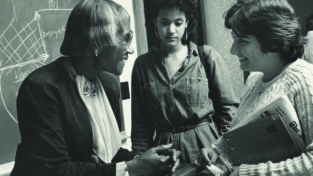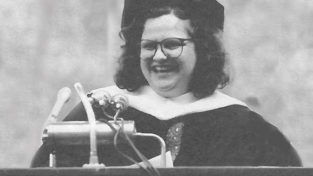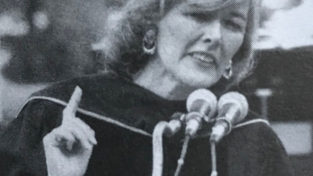No Intention of Being Quiet
Listen to Shirley Chisholm’s commencement address to the Mount Holyoke class of 1981 and watch Chisholm announce her bid for the Democratic nomination for the 1972 presidential election.
Dear graduates, as you prepared to leave here today, you are undoubtedly filled with emotion. It is a time of great happiness, for each of you has completed the task that you came here for. It is a day of anticipation as you embark upon a future guided by your own hopes and dreams, but marked with uncertainty. It is also a time of sadness because you are leaving the many friends you have made here and the institution that has served as your home for the past 4 years.
But most importantly, it is a new beginning in that each of you can now proceed to bring to fruition your own personal career and occupational objectives. You now have the capacity to taste the knowledge you have attained from your books and your professors and mold that education into a tool with which you can begin to carve out your place in our society.
And while each of you have different pursuits and different aspirations, I hope that all of you share a common concern for your fellow human beings and that you will use your education to help to really build a better world.
H.G. Wells warned us some 60 years ago that human history becomes more and more a race between education and catastrophe, and I caution you that unless you have in your hearts a willingness to apply what skills you have refined to careers and objectives which are born out of social responsibility, then our society’s investment in each of you has been wasted and we will move closer to that final catastrophe.
There is an old but nevertheless meaningful adage which states to those to whom much is given, much is expected. And so while each of you can rightfully take pride in the accomplishments all of us are celebrating here today, you must of course be ever mindful that you have now entered a special group in this country that is particularly vital to our future and that most Americans your age do not have your education and your opportunities.
We face an ever-present crisis of energy resources. We are confronted with an escalating arms race in which this nation and other world powers are stockpiling armaments and atomic weaponry under the insane rationale that doubling and redoubling our ability to make war will somehow enhance the prospects for peace.
And meanwhile we have yet to be able to accommodate the problems of the unemployed, the poor and the minorities who have been victimized by circumstances they have no control over and do not really often understand.
The road to full economic recovery has yet to be traveled by our new administration, and I have a fear that we will be dealing with the economic consequences and recessionary trends of the past six years in this nation for a long time to come.
And yet for the multiplicity of problems that we as a nation are now facing, there is also an impoverishment of spirit which has taken hold and it’s caused many beautiful young people to reject political involvement and the goals of progressive social change.
By contrast, we can take a look at American youth during the 60s, and they believe James Baldwin when he said, “Not everything that is faced can be changed, but nothing can be changed until it is faced.”
And that activist period in our history taught all of us that the young people of this country when organized then inspired can become a politically powerful force to be reckoned with.
It was after all the involvement of the young people on many college campuses during that decade which eventually resulted in an end to this country’s tragic involvement in the war in Southeast Asia.
It was black and white young people working together and marching together which helped to bring the cause of civil rights into national focus.
It was the searching, questioning young people in groups like Common Cause and Environmental Action who demanded that our government become more accountable and more honest to its citizens.
But now at a time when a renewed spirit and the revitalization of our people is most needed, the national spirit still seems to be demoralized. The enthusiasm once evidenced among young people has turned to disgust or apathy. People from all ages and from all points of the political spectrum have minimized their civic and their political involvement because they truly believe that it is almost impossible to make any meaningful changes in our system. They do not heed the timeless warning of Edmund Burke when he said that the only thing that is necessary for the triumph of evil is for good men to do nothing.
I stated earlier that I truly believe that the primary responsibility of the educated in the individual in our society is that he or she must translate the knowledge gained by the educational process into a commitment to share the opportunities which abound in this country.
In other words, my graduating friends, your education has a context. Not just a political one but also a social one and a moral one. And when I look out into an audience like this one and I attempt to anticipate your hopes and your dreams, I am struck by the potential which exists.
And I believe that the key to maintaining social involvement and remaining idealistic throughout one’s life is in maintaining a youthful vitality.
The late Robert Kennedy, himself an example of young vitality, once defined youth in words which I feel are even more true today. He said that youth is not a time of life but a state of mind, a temper of will, a quality of the imagination, a predominance of courage over timidity and the appetite for adventure over the love of ease. These qualities are what I really believe we will need to help propel this ship of state as we embark upon our third century as a nation.
I am certain that our country will face great crises and trials during the next four years, and I know that all of us have a monumental task ahead. But I also believe that we must begin to travel the road to rebirth and rejuvenation in this country.
The United States of 1981 is at its crossroads of confidence. It will be up to you, not those of my generation, to assure that the goals of our government, of our nation, are the purest, the most moral and the most democratic.
Do not assume that you are powerless, that you cannot make an impact. Be as bold as the first man or woman to eat an oyster. [laughter] Many of the great endeavors throughout history have resulted from the actions of and commitment of one individual, i.e., Rosa Parks.
Social progress and social justice are functions of society which can be brought about by those who make the decision to apply their knowledge, their energy and their talents to our national goals.
I am convinced that America will stand or fall, succeed or fail, progress or falter on the merits of the efforts each of you individually will put forth.
I hope that all of you will recognize that the opportunities which is presented to each of you as you leave academia is the desire to contribute positively to making a better nation and a better world, not just for yourselves but for those who have not enjoyed your experiences.
As you leave Mount Holyoke today, I ask that you ponder just how you will wear the mantle of responsibility which accompanies the achievements we are celebrating here today. You will do your best when you set the highest standards and goals and then make every effort to do what the Greek philosophers admonished us to do centuries ago. That is to tame the savageness of all men and to make gentle the life of the world.
Use the knowledge and the God-given intelligence you have to learn as much as you can about what is going on, not just in this country but throughout the world. Ask questions, demand answers, do not just tend your garden, collect your paycheck, bolt the door and deplore what you see on television. Too many Americans are doing that already. [applause]
Instead, you must live in the mainstream of your time and your generation. You must use the education that you got from reading the fine print and the experience you got from not reading it. You must call upon the knowledge and the self-discipline that you have acquired to together forge a new path and to seek new solutions after the tired ones of the past have failed.
But I sincerely believe that there will be those of you in this audience this afternoon who will seek new solutions, who will give of yourselves in order to make this country and this world a better place. I hope that you can be counted in that group and that you will not lose courage or heart when you attempt to change our society for the better.
In conclusion, just let me leave these final words with you. Let all of us together right now ignite our inner fires of commitment, idealism and determination, because depending on the brilliance of those flames, future generations behind you will either look back with gratitude at your strength or they will suffer the consequences of your weakness.
In these final years of the 20th century, God bless you and the best of luck to you and whatever endeavor you will pursue.
Audio is courtesy of UMass Amherst Special Collections and University Archives and the transcript comes from the Archives for Women’s Political Communication at Iowa State University.
November 4, 2019










Leave a Reply